- Home
- Dan Millman
SACRED JOURNEY OF THE PEACEFUL WARRIOR Page 3
SACRED JOURNEY OF THE PEACEFUL WARRIOR Read online
Page 3
“I’m okay, thanks,” I replied, standing up with some effort.
“You don’t look okay,” she said. “You look tired.”
Irritable, I almost snapped, What business is it of yours? But I took a deep breath instead. “You’re right,” I confessed. “I am tired. But I’ve been tired before; I’ll be fine, thanks.” I expected her to nod and walk away, but she stood there, staring at me.
“Just the same,” she said, “I’ll bet you could use a glass of juice.”
“Are you a doctor or something?” I asked, half in fun.
“No,” she smiled. “Not really. But Victor—my godson—he burns it at both ends, too.” Seeing my puzzled look, she quickly added, “You know, his candle.”
“Oh,” I replied, smiling. She seemed like a nice lady. “Well, I guess I could stand a glass of juice. Can I get you one, too?”
“That’s very nice of you,” she said as we entered a sidewalk café next door to the bank. I noticed she walked with a pronounced limp.
“My name’s Ruth Johnson,” she informed me, leaning her old bamboo cane against the counter and reaching out to shake hands. Johnson—it wasn’t your typical Asian surname; I guessed she was married to a Caucasian.
“Dan Millman,” I said in return, shaking her hand. I ordered a carrot juice.
“The same,” said Mrs. Johnson. As she turned her head toward the waitress, I studied her face—part Hawaiian, I guessed, or maybe Japanese or Chinese, with an overlay of tan.
The waitress set our juices down on the counter. I picked mine up, then noticed Mrs. Johnson staring at me. Her eyes caught mine, and held them. She had deep eyes, like Socrates. Oh, come on, I thought. Stop imagining things.
She continued to stare. “Do I know you from somewhere?”
“I don’t think so,” I said. “This is my first time here.”
“In Honolulu?”
No, on planet earth, I thought. “Yes,” I said aloud.
She examined me intently for another moment, then remarked, “Well, then, it must be my imagination. So, you’re visiting?”
“Yes, I’m on the faculty at Oberlin College—here on a research trip,” I replied.
“No, go on! Oberlin? One of my nieces went to Oberlin!”
“Oh, really,” I said, looking at my watch.
“Yes. And my godson, Victor—he’s considering it for next year. He just graduated from Punaho School. Say, why don’t you come over to the house tonight? You could meet Victor; he’d be thrilled to talk with an Oberlin professor!”
“I appreciate the invitation, but I have other plans.”
Not at all discouraged, but with a trembling hand, she scrawled an address on a piece of paper and handed it to me. “If you change your mind.”
“Thanks again,” I said, standing to leave.
“Thank you,” she said, “for the juice.”
“My pleasure,” I answered, tossing a five-dollar bill on the counter. I hesitated for a moment, then asked, “You don’t happen to work in a bank, do you?”
“No,” she answered. “Why?”
“Oh, it’s nothing.”
“Well then, aloha,” she waved. “Create a nice day.”
I stopped and turned back toward her. “What was that you said—‘Create a nice day’?”
“Yes.”
“Well, most people say, ‘Have a nice day.’”
“I suppose they do.”
“It’s just that an old teacher of mine—he used to say that.”
“Really,” she nodded, smiling at me in a funny kind of way. “How interesting.”
My reality meter started buzzing; my tongue went a little numb. Was something a little off?
She stared at me again, then impaled me with a look so intense the café disappeared. “I know you,” she said.
Suddenly, everything grew brighter. I felt my face flush, and my hands started to tingle. Where had I last felt like this? Then I remembered. An old gas station, one starry night.
“You know me?”
“Yes. I wasn’t sure at first, but now I recognize you as a good-hearted person, but I think a little hard on yourself.”
“That’s it?” I said, let down. “That’s what you meant?”
“And I can tell that you’re lonely, and that you need to relax a little more. A barefoot walk in the surf would relax you—yes, you need a barefoot walk in the surf,” she whispered.
Dazed, I hear myself ask, “A barefoot walk in the surf?”
“Exactly.”
In a fog, I started toward the exit, when I heard her say, “See you tonight—about seven o’clock.”
I DON’T CLEARLY REMEMBER leaving the café. The next thing I knew, I found myself carrying my shoes, walking along the clean, wet sand of Waikiki, my feet washed by the shallow surf.
Some time later, a seagull landed nearby. I glanced at it, then suddenly looked up and around as if waking up. What was I doing here? In a moment it came back to me: Ruth Johnson … the café … her house … seven o’clock. I looked at my watch; it said 6:15.
A quarter after six, a quarter after six, I repeated to myself, as if that meant something. Then it dawned on me: I had just stood up Barbara, the pretty bank teller.
I felt pretty, too—pretty dense.
And so, with nothing else to do, I caught a bus to an attractive suburb of Honolulu, then walked until I found the address Ruth Johnson had written down. At least I thought I had found the right address; her handwriting wasn’t very clear.
At 7:15, I walked up the driveway of a well-kept home. Cars filled the driveway, dance music poured out of the open doorway, and an older woman sat on a porch swing, gliding in and out of the moonlight. I climbed the steps and saw that she wasn’t Ruth Johnson. Inside I heard people talking loudly. Someone laughed. I had a sinking feeling that this was the wrong place.
The woman on the swing said, “Aloha! Go on in!”
I nodded to her and entered the house, surveying the large living room, crowded with teenagers and a few older men and women—dancing, talking, eating—the women in flowered dresses or halter tops, and the men in jeans, T-shirts, and tank tops.
The music stopped for a moment; I heard a splash as someone jumped, or fell, into the swimming pool just visible through sliding doors. Loud laughter followed.
I tapped a young woman on the shoulder just as a rock-’n’-roll tune started; I had to yell to be heard above the music. “I’m looking for Ruth Johnson.”
“Who?” she yelled back.
“Ruth Johnson!” I yelled louder.
“I don’t know too many people here,” she shrugged. “Hey, Janet,” she called to someone else. “You know any Ruth Johnson?”
Janet said something I couldn’t hear. “Never mind,” I said, and headed for the door.
Walking down the front steps, I stopped, and gave it one last try. Turning to the woman on the swing, I asked, “Does Ruth Johnson live here?”
“No,” she said.
“Oh.” Depressed, I turned to leave. Couldn’t I do anything right?
“Ruthie’s staying with her sister down the street,” the woman added. “She went to buy more soda.”
Just then, a car pulled up in front.
“There she is now,” the woman pointed.
No one got out of the car at first. Then I saw Ruth Johnson climb slowly to her feet. I quickly ran down the steps to meet her, anxious to get to the bottom of all this, one way or the other.
She was reaching to pick up a grocery bag when I said from behind her, “Let me help you with that.” She turned and looked delighted—but not surprised—to see me.
“Mahalo! Thank you!” she said. “You see, I was right about your being a kind person.”
“Maybe not as kind as you think,” I said, as a picture of my young daughter, and the wife I’d left behind, flashed through my mind.
I walked slowly up the front steps to keep pace with her. “So, why did you really invite me here?” I asked.
<
br /> “Sorry to slow you down,” she said, ignoring my question. “I had a small—well, stroke, you could say. But I’m getting better all the time.”
“Mrs. Johnson, can we get to the point?”
“I’m glad you found the house,” she said.
“I’ve come a long way—“
“Yes, people come from all over for one of our parties. We really know how to have a good time!”
“You don’t really know who I am.”
“I don’t imagine anyone really knows who anyone really is. But here we are anyway,” she said brightly. “And while you’re here, why don’t you come in, meet Victor, and enjoy the party?”
Disappointed, I leaned up against the wall and stared at the ground.
“Are you all right?” she asked, concerned.
“I’m okay.”
“Hey, Ruthie,” someone yelled from inside. “Did you bring the soda and chips?”
“Have them right here, Bill.”
She turned to me. “Uh, what did you say your name was?”
I looked up at her. “Dan.” It came out like “damn.”
“Well, Dan, come on in, dance a little, meet some people. That should perk you up.”
“Look, I appreciate the offer—you seem like a nice lady—but I’d better be going; I have a lot to do tomorrow.” Suddenly tired, I took a deep breath and stood. “Have a nice party, and thanks—uh, mahalo—for your kindness.” I turned toward the street.
“Wait a moment,” she said, limping after me. “Look, it was my mistake, having you come all the way out here. Let me give you something for the road.” She reached into her purse.
“No, really, I couldn’t. I don’t need—“
She grabbed my hand and looked me in the eyes; the world started spinning. “You take this,” she said, pushing what looked like crumpled bills into my hand. “Maybe we’ll meet again.”
She turned abruptly and entered the house. The sound of music grew louder, then suddenly quiet as the door slammed shut.
Clenching the money in my fist, I shoved it into my pocket and walked on, into the warm night.
Coconut and banyan trees and landscaped lawns faintly shone under the light of the street lamp near a bus stop, where I collapsed to a sitting position, trying to clear my head. Something was off here; nothing made sense. It had to be her, but it wasn’t. I was back to zero.
I didn’t know if I could bring myself to visit another bank; I was tired of getting treated like a nut case. Maybe it was hopeless; maybe I was just a strange person, as my wife had said. Maybe she was right about everything. Why couldn’t I just be a normal guy and go to ball games and movies and have barbecues on Sunday?
I was seriously considering flying home the next day and seeing a good therapist when the bus arrived with a sighing of air brakes. The door opened; I got to my feet and reached into my pocket for the money—and saw that Ruth Johnson hadn’t given me any money after all.
“Hey, buddy,” the bus driver said. “You getting on or not?”
Intent on opening the crinkled pieces of paper, I hardly heard him, and didn’t answer. Then my eyes opened wide and I stopped breathing. Vaguely aware of the bus pulling away without me, I stared at the two pieces of paper in my hands: The first was a newspaper ad, clipped from the “Personals” section. It began, “Young peaceful warrior, friend of Socrates.” I heard myself breathing rapidly; my whole body trembled.
On the second piece of paper, I found a note Mrs. Johnson had scrawled in a shaky, nearly illegible hand. It read:
I’m from the old school—the hard school. Nothing is given without desire, preparation, and initiation. There is a question of trust, and faith. On Thursday evening, three nights from now, the currents will be exactly right. If you wish to continue, follow all these instructions precisely: Go to Makapuu Beach in the early evening.
I turned the note over. It continued:
You will see a rocky area toward Makapuu Point. Walk toward the point until you find a small shed. One side is caved in. Behind it, you’ll see a large surfboard. When you are alone—at dusk, not before—take the board and paddle out beyond the surf. A strong tide will be going out; let the currents take you. Be sure …
Strange—that was all. “Be sure …” The note ended there. What did she mean by that? I wondered, stuffing the note back into my pocket.
Then my wonder changed to excitement and a profound sense of relief. My search was over. I’d found her! A fountain of energy welled up inside me. My senses opened; I felt the temperature of the air, heard faraway crickets, and smelled the fresh aroma of newly mowed lawns, wet from an earlier rain. I walked all the way back to my motel. By the time I arrived, it was nearly dawn.
I fell onto the bed with a bounce and a squeak and stared at the ceiling. Much later, I drifted to sleep.
That night, I dreamed of skeletons—hundreds of them—bleached white by the sun, washed up on the rocky shore, lying askew on black lava rock. A wave crashed, and the shore was washed clean, leaving only the lava, black as night. The blackness swallowed me. I heard a roar, soft at first, then growing louder.
Awakened by the whine of a garbage truck outside, I opened my eyes and stared at the ceiling—but the stark images of skeletons remained in my mind, along with a sense of awe and foreboding. Thursday evening, it would begin.
THINGS WERE PICKING UP; a new wave was rising. Just like the old days. This intensity and excitement made me realize how sleepy my life had felt these past few years: I had become an armchair warrior whose battles were championed by alter egos on television or at the movies. Now I was on my own feet, waiting for the bell.
CHAPTER 4
A Fire at Sea
What is to give light must endure burning.
—Viktor Frankl
I HAD MADE NO SPECIAL PREPARATIONS, because apparently none were called for—just find a big surfboard and go for a paddle.
Thursday afternoon, I checked out of my hotel, ready to camp on the beach, ready for a change, ready for anything. Or so I thought. I carried my belongings, stuffed into my backpack, down to Makapuu Beach. Breathing in the fresh, salty air, I walked toward the point. In the distance ahead, atop a mound of lava rock, I saw an old lighthouse standing starkly against a crimson sky.
The walk was farther than I’d thought; it was nearly dark before I found the shed. The surfboard was there, just as she’d said. It wasn’t the streamlined fiberglass I’d expected, but a massive, old-fashioned slab of wood, like the boards used by the ancient Hawaiian kings—I’d seen a picture of one in National Geographic.
I looked out over the deserted beach and calm ocean. In spite of the setting sun, the balmy air was comfortable. I stripped to my nylon trunks, stuffed my clothing and wallet into my pack, and hid my pack in the bushes. Then I carried the heavy board out into thigh-deep surf and set it down with a loud slap on the glassy surface.
With a last look down the beach, I pushed off, glided out, and paddled awkwardly through the waves. Panting with exertion, I finally broke through the last phosphorescent whitecap, barely illuminated by a waning moon that appeared and disappeared with passing clouds. Resting on the ocean’s gentle rise and fall, I wondered about this strange initiation. Pleasant enough in the tropical sea, but how long did Ruth Johnson want me to float out here before coming back in. All night?
The rhythmic ocean swells soothed me into a pleasant lassitude. I lay on my back and gazed up into the constellations of Scorpio and Sagittarius. My eyes scanned the heavens and my thoughts drifted with the current as I waited for who knows what—maybe further instructions from a spaceship for all I knew.
I MUST HAVE FALLEN ASLEEP. I sat up, waking with a gasp, not knowing where I was. I found myself straddling the board as it rocked with the swells. Until I awoke, I hadn’t realized that I’d been asleep. I wondered if enlightenment was like that.
I was looking around, trying to make out the coastline in the darkness when it struck me: the current. She had written s
omething about the current being “exactly right.” For what? I scanned the horizon in every direction, but with the sea’s rise and fall, and the cloud cover, I was effectively blind until dawn; I saw no stars, no land.
I had left my watch on shore and had no sense of time or bearings. How long had I drifted? And where? With a chill, I realized I might be drifting straight out to sea. Gripped by a sudden panic, I forced myself to calm my breathing. Paranoid fantasies played in the theater of my imagination: What if this old woman is an eccentric, or even crazy? What if she has a score to settle with Socrates? Would she deliberately … ? No, it couldn’t be, I thought. But I had no certainty, no reference points. My usual methods of reality testing weren’t helping me here.

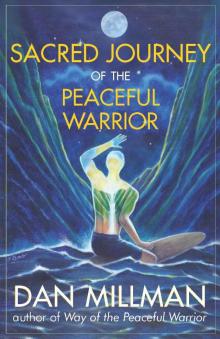 SACRED JOURNEY OF THE PEACEFUL WARRIOR
SACRED JOURNEY OF THE PEACEFUL WARRIOR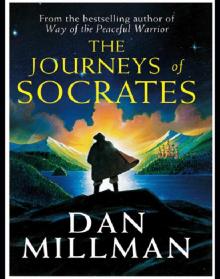 The Journeys of Socrates: An Adventure
The Journeys of Socrates: An Adventure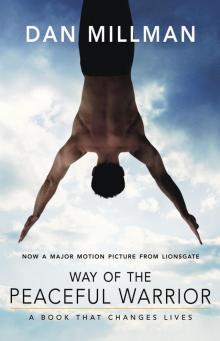 WAY OF THE PEACEFUL WARRIOR: A Book That Changes Lives
WAY OF THE PEACEFUL WARRIOR: A Book That Changes Lives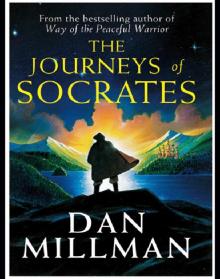 The Journeys of Socrates
The Journeys of Socrates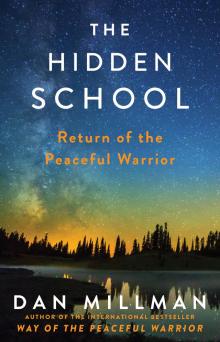 The Hidden School
The Hidden School